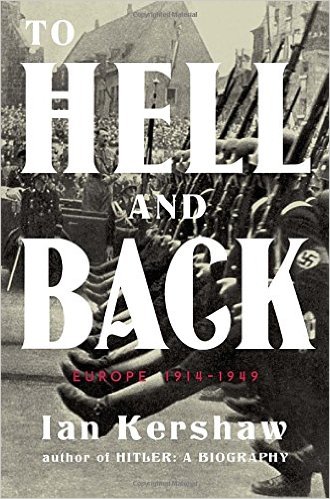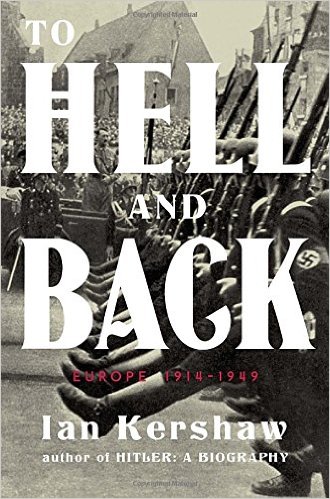
Finest Hour 172
Books, Arts, & Curiosities – The Long Struggle

June 12, 2016
Finest Hour 172, Spring 2016
Page 46
Ian Kershaw, To Hell and Back: Europe 1914–1949, Viking, 2015, 593 pages, $35.00. ISBN: 978-0670024582.
Review by Kevin Matthews
 A young Winston Churchill wrote in 1901: “The wars of peoples will be more terrible than those of kings.” The next fifty years proved he was right, and it is fitting that Ian Kershaw opens his history of twentieth-century Europe with Churchill’s prediction. The first of a projected two–volume work, this book, like the years it covers, is dominated by war, a period when Europeans sank “into the pit of barbarism” (1).
A young Winston Churchill wrote in 1901: “The wars of peoples will be more terrible than those of kings.” The next fifty years proved he was right, and it is fitting that Ian Kershaw opens his history of twentieth-century Europe with Churchill’s prediction. The first of a projected two–volume work, this book, like the years it covers, is dominated by war, a period when Europeans sank “into the pit of barbarism” (1).
Readers of Finest Hour may be disappointed that Churchill plays only a walk-on role here and there in Kershaw’s account of these events. To Hell and Back is part of a trend that has refocused the telling of these years on central and eastern Europe, what he calls the continent’s “killing grounds” (19). Even so, most will find it a worthy addition to their bookshelves.

2024 International Churchill Conference
In many ways, To Hell and Back echoes the observation made by Churchill long ago that, between 1914 and 1945, Europeans waged a second Thirty Years’ War. Others call it a “European Civil War,” an ideological struggle between liberal democracy, Soviet-style communism, and fascism in which, until the very end, it looked as if liberal democracy would come out the loser. Kershaw’s contribution is in the way he constructs this story. In this telling, Europe’s near- suicide can be explained by four inter-related causes: “an explosion of ethnic-racist nationalism,” “bitter and irreconcilable demands for territorial revisionism,” “acute class conflict” further inflamed by Russia’s Bolshevik Revolution, and “a protracted crisis of capitalism” (2). While these elements, alone or in combination, could be found in most of Europe, all four came together in one place: Germany. The result took Europeans “the closest they came to hell on earth” (346).
It was not supposed to be that way. Despite the all-too-evident gap between rich and poor, the near feudal conditions found in eastern Europe’s countryside, not to mention a growing trend in which nationalism was becoming hard to distinguish from racism, and especially antiSemitism, at the dawn of the century most Europeans looked forward to an ever more stable, prosperous future. Memories of a “golden age” before 1914, Kershaw argues, were no postwar illusion. “The old world in its sunset,” to use Churchill’s poetic turn of phrase, “was fair to see.”
The Great War, of course, changed all that. Even though the 1939–45 conflict was far more destructive, the struggle of 1914–18 set in train all that was to follow. Again, it was not supposed to be that way. However much the victors deserve to be condemned for the Treaty of Versailles, Kershaw points out that their goal was laudable: namely, a new Europe founded on democracy. Indeed, after the experience of the war, Europeans demanded nothing less. But, there was a paradox. Mass-participation politics when coupled with new forms of communication, notably radio and film, also could be used by extremists on both left and right to cripple and then destroy the very governments on which so many set their hopes.
Never far from the picture is Adolf Hitler’s looming presence. The question of whether his drive to war could have been stopped is impossible to answer. For his part, Kershaw maintains that Churchill’s pleas for a “grand alliance” of Britain, France, and the Soviet Union never stood a chance because leaders in London and Paris loathed the Soviets at least as much as they did the Nazis. Even so, he agrees that Churchill’s grand alliance was the “best option” for averting the catastrophe many saw coming (334). In that sense, the Second World War really was “the unnecessary war.”
Kevin Matthews is a Professor of History at George Mason University. He is the author of Fatal Influence: The Impact of Ireland on British Politics, 1920–25 (University College Dublin Press, 2004).
Subscribe
WANT MORE?
Get the Churchill Bulletin delivered to your inbox once a month.


